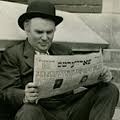 I believe that Isaac Bashevis Singer, Norman Levine, Philip Roth and probably numerous other Jewish writers have penned comical reminiscences about their experiences delivering lectures on various subjects to Jewish audiences. To this list we must add the relatively unknown name of Abraham Shulman. An American essayist and former contributor to the New York Daily Yiddish Forward, Shulman nearly 30 years ago published a humourous volume about his cross-country podium experiences titled Adventures of a Yiddish Lecturer. I first read the book years ago and found it just as funny when I read it again this summer (2008).
I believe that Isaac Bashevis Singer, Norman Levine, Philip Roth and probably numerous other Jewish writers have penned comical reminiscences about their experiences delivering lectures on various subjects to Jewish audiences. To this list we must add the relatively unknown name of Abraham Shulman. An American essayist and former contributor to the New York Daily Yiddish Forward, Shulman nearly 30 years ago published a humourous volume about his cross-country podium experiences titled Adventures of a Yiddish Lecturer. I first read the book years ago and found it just as funny when I read it again this summer (2008).
Also a longtime writer at the Forward, Singer wrote a short introduction commending Shulman’s book and noting the difficulties inherent in giving lectures to Jewish audiences, particularly first-generation immigrants that he described as being full of contradictions and inconsistencies. “It isn’t easy to lecture to such people,” Singer observed. “They ask countless questions; they’re full of just and imagined claims and grudges. They’re disappointed by a world which didn’t follow the plans which their leaders had mapped out. They are always pathetic, often tragic, and frequently comical.”
Shulman arrived in New York from Europe in the fifties and spoke briefly at a reception in his honour. Afterwards a man from an important Jewish agency told him, “You have the tongue of a speaker. It’s a gold mine,” and invited him onto the Yiddish lecture circuit. Shulman hit the road to speak on such subjects as Yiddish literature, folklore and Jewish humour.
Scheduled to address a Jewish society, Shulman arrived to find the members in the midst of a heated quarrel over whether to allow “strangers” to purchase plots in their cemetery. They couldn’t even agree over the proper protocol of introducing their guest speaker, who had been crammed into the evening’s agenda. When one member rose to welcome him, another jumped up to object. After half an hour the chairman motioned Shulman to the dais, announcing that his topic was Jewish Humour and that “he will be as brief as is humanly possible.” When Shulman started to tell a joke the chairman raised his hand, saying “Let’s stick to brass tacks.”
At a lecture on the humour of Menachem Mendel Seforim, the chairman demanded strict decorum from the audience, inhibiting their laughter even while Shulman was reading one of Seforim’s funniest passages. “Mr. Birenbaum,” the chairman berated one man who couldn’t control himself, “if you want to laugh, you may go home. There you may roar like a wild donkey. Not here. This is a cultural institution.”
Shulman once arrived at an empty hall, wondering if he had made a mistake. Several minutes after he was due to speak, the audience arrived in two buses and filled the room. Someone in their society had died and they had just come from the funeral. His topic was the Sublimity of Jewish Humour.
On another occasion only a few executive members turned up for Shulman’s serious lecture on Fyodor Dostoevsky. Shortly after he began, Shulman was interrupted by the secretary, who informed the chairman that another person was in the building — Mrs. Zaydenbaytel, in the library. The chairman insisted she be fetched immediately.
Mrs. Zaydenbaytel, it turned out, was reading a book by Sholom Aleichem and preferred to stay where she was. Nevertheless, the chairman was adamant that she “must fulfill her duties as a member and take part in our cultural activities.” Mrs. Zaydenbaytel again refused to budge, so the secretary and treasurer went back to her a third time. “Two minutes later the door opened with a loud bang. Mrs. Zaydenbaytel, a massive woman, was brought in by the secretary and the treasurer, both tightly holding on her elbows.”
Defiant, she kept reading her book, occasionally laughing very loudly. Finally, the chairman signaled Shulman to stop, and told Mrs. Zaydenbaytel she could read if she wished but absolutely had to stop disrupting the lecture with her laughter. “Impossible,” she replied. “You simply can’t read Sholom Aleichem and keep your mouth shut.”
Once, as Shulman was about to begin a lecture on Isaac Bashevis Singer, a woman dressed in heavy makeup and large earrings began scrutinizing and flirting with him. Why do “they all come running?” she wondered aloud, observing that he wasn’t particularly handsome, virile or muscular. “I’m curious about your power,” she told him, adding that she had made a list of all his “conquered fortresses” and wouldn’t mind becoming a conquered fortress herself.
Deeply puzzled, Shulman sought to extricate himself as he heard the master of ceremonies introduce him from the podium; the woman blocked his path. “He’s not calling you,” she said. “He’s calling someone named Shulman.” When Shulman explained that his name was, in fact, Shulman, she glared at him in disbelief. “You’re not Isaac Bashevis Singer?” As he began his lecture, she stormed to the door and noisily demanded her money back. ♦
© 2008






